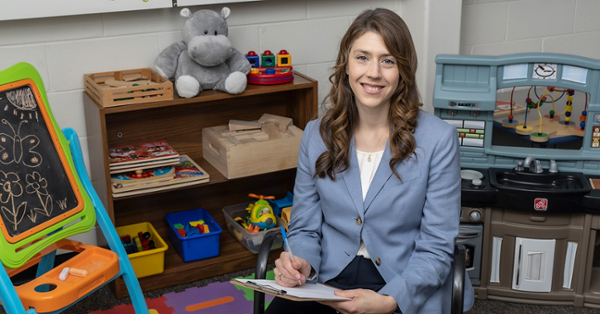NIH grant supports VR training for parents of children with autism
NIH grant supports VR training for parents of children with autism

Around one in three individuals diagnosed with autism spectrum disorder present with unsafe behaviors—like aggression, self-injury and property destruction—during childhood, according to Christina A. Simmons, Ph.D., a board-certified behavior analyst who focuses on helping these children and their parents.
With a three-year, $450,000 grant from the National Institute of Child Health and Human Development, the associate professor in the College of Science & Mathematics’ Department of Psychology is expanding her efforts to integrate virtual reality (VR) training for families into her applied research.
“We have behavioral treatments we can implement in a compassionate way to decrease behaviors of concern,” Simmons said. “But for those treatments to make a meaningful impact in the natural environment, they need to transfer to natural change agents, like parents.”
Preparing parents to implement these treatments is critical, but barriers to accessing high-quality training programs often keep parents from mastering these skills or being able to implement them in the home when faced with challenges. Simmons views VR-based training methods as particularly effective for parents because the technology can address barriers like time, cost and child care needs. Through avatars customized to each child’s specific behaviors and treatment recommendations, the portable VR training tool offers parents opportunities to practice interventions during realistic scenarios on their own schedules.
“VR is one way we're going to be able to reach more individuals and make their training more meaningful,” said Simmons, who also holds appointments at Cooper Medical School and the Rowan-Virtua School of Osteopathic Medicine at Virtua Health College.
Simmons and co-investigators Bethany Raiff, Ph.D., professor of psychology, and Patrice Tremoulet, Ph.D., associate professor of psychology, are working closely with George Lecakes, Ph.D., associate director of Rowan’s Machine & Artificial Intelligence VR Center, Amanda Almon, M.F.A., professor in the Department of Radio, Television & Film, and statistician Babis Papachristou, Ph.D., associate professor in the Department of Mathematics.
“This work wouldn't be possible if we didn't have an interdisciplinary team of people who are all invested in this project,” Simmons said.
The research team has already developed training content through a small pilot grant. The new grant will allow researchers to conduct a comparative study working directly with school-age children and their families to provide behavioral treatment through the Rowan Center for Behavior Analysis, where Simmons serves as director. The researchers are also a year into a three-year project, funded by a $300,000 grant from the New Jersey Department of Health’s Governor's Council for Medical Research and Treatment of Autism, to train early-career behavioral clinicians using VR.
Simmons’ federal funding supports student engagement in the research process. In her role as project coordinator, first-year clinical psychology Ph.D. student Amelia Yanchik is overseeing the development of the team’s undergraduate research assistants.
“Our goal is to build skills to empower the research assistants to make meaningful contributions and eventually take on leadership roles in the project,” Yanchik said. “I am excited to see the ways working on this grant shapes the trajectory of their future careers.”
Having access to this research opportunity early in students’ education “is an amazing opportunity for students to see behavioral assessment and intervention skills put into place and interact with families directly,” Simmons said.